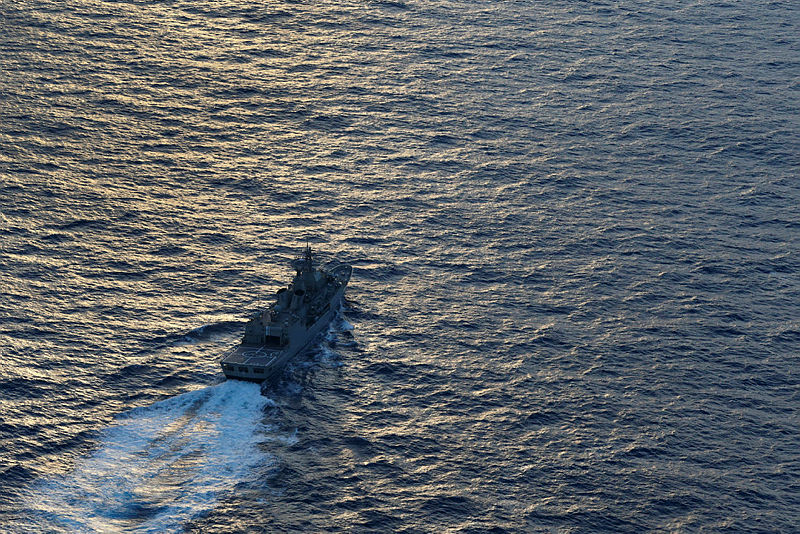
Just under a year ago Admiral Harry Harris was the keynote speaker at the ASPI Future Surface Fleet dinner. Immaculately attired in his starched whites he warned—with a firm delivery—that China is building a ‘great wall of sand’ in the South China Sea. He was absolutely right.
But since then, what’s actually happened to stop this build up? Although Washington has authorised a few confusing demonstrations that it’s still prepared to sail or fly through the disputed territory, Beijing’s land reclamation activities have continued apace. If anything, the past year has demonstrated this is China’s sea and attempts by the US to internationalise the waters are little more than transient, meaningless annoyances, easily brushed away. The stark reality is that every day, in every way, this mare nullius has already been occupied.
That’s the huge challenge Harris took on when he attempted to address this issue: trying to turn back the clock. A couple of years ago it may have (theoretically) been possible to find some way of dividing up the sea between the rival claimants. Today it isn’t, and it’s the sort of thing that’s far too important to be left to the Admiral. China has decided to act; Harris’ noisy objections are nothing more than an annoying gadfly to the real decision makers in Zhongnanhai. In fact, the more noise the US makes over the South China Sea, the more it emphasises the reality that Beijing is in control.
After all, what can the US do?
The very thought that it might be worth going to war over the South China Sea suggests a certain detachment from reality. Most importantly, China has already occupied the islands. Washington may fly planes and sail ships through the region, but they’re not staying there. Any transient demonstration of power demonstrates nothing more than the reality that Washington isn’t a participant in this game. The rival ASEAN and Taiwanese claimants for those waters took too long to negotiate an agreement. Beijing has acted and now there’s a fait accompli. How will that be turned back? With force?
Hardly. Harris is talking up a storm: he’ll only get one if China plays ball and attempts to interdict one of his passing demonstrations. The problem is that these are far more likely to emphasise US weakness than serve as a warning.
Imagine if, for example, a US plane is downed. What next? The stakes here aren’t big enough for war and it’s not the first time a plane’s been lost. In mid-2001 a collision between an EP-3 Orion and a pair of J-8 interceptors resulted in the death of the Chinese pilot and the signals intelligence plane making an emergency landing in Hainan. Tensions escalated, a carrier group sailed through the region to demonstrate Washington’s ‘resolve’, and Beijing returned the aircraft’s equipment in bits, having carefully catalogued every item, nut and bolt.
It’d be difficult to chalk up any similar incident occurring today as representative of some kind of success in checking Beijing’s expansion. And just say the Orion had been brought down; is this really the way the US wants to go to war with China?
The second alternative is far worse. What if President Trump were to deliberately order the Seventh Fleet to sail in and provoke a response from the Chinese? Currently, I suspect Beijing would hold fire and ignore the deployment; after all, the fleet would soon sail away and that’s the real point; China’s there to stay.
The danger is, though, that missiles might be fired, because from that moment on escalation wouldn’t be just a possibility, but a necessity.
At the moment, and speaking theoretically (we’ve got no real idea how advanced warheads have become) a US carrier group could defend itself from missiles fired at it, but sailing into danger wouldn’t be a wise way to find out. China has its missiles based on the mainland. That means the conflict wouldn’t be able to be limited to the waters around the islands as, say, the Falklands War was. Escalation would be immediate and the risks are too great to consider. The principle of freedom of navigation is all very well, but I certainly don’t want to die for it. Yet that’s what Harry Harris is asking us to be prepared to do.
And finally, what exactly is Australia’s stake in this? Why are we bothering to fly aircraft all the way up here? What if it was an Australian Orion that was shot down, as a Chinese paper recently suggested, by a ‘rogue missile’? What would our reaction be—to suffer an immediate and dramatic plunge in our standard of living by refusing to sell LNG to China or perhaps to boot out the legitimate students who’ve come to Australia to study?
Harris speaks well. He has a dramatist’s ability to turn a semi-plausible idea into a story told with vigour, urgency and power. But that’s all it is—drama—and it doesn’t mean he’s right. Perhaps most critically, his interests aren’t Australia’s, although there’s an increasing and dangerous tendency to conflate what Washington wants with what Canberra should do.
Time is on China’s side. I want it to be on Australia’s as well.

